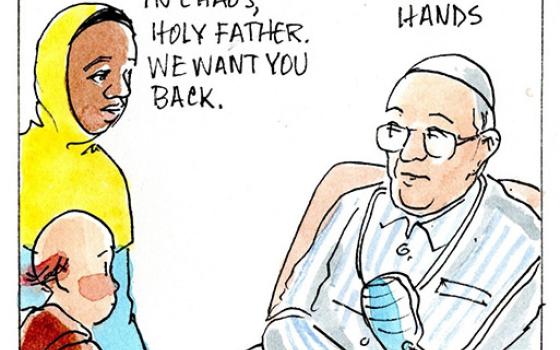Another front has opened in the war on religious liberty and it has nothing to do with the Obama administration. In Missouri, religious leaders are being told that their continued opposition to predatory lending practices will jeopardize their tax-exempt status.
Payday lenders are a blight on the nation, but the stain seems particularly foul in the Show Me State. An editorial at St. Louis Today noted that Missouri is “completely out of whack with national norms” on the issue, and that lenders in the state can charge, legally, as much as 1,980 percent on small, short-term loans of up to $500. You read that correctly: 1,980 percent. This at a time when interest rates are at historic lows.
Religious groups, including the PICO National Network, a leading faith-based community organizing group, are leading the charge to change the law, organizing religious communities throughout Missouri to demand that these predatory practices cease. The targets of these practices are the poor, those who already have the most difficult time accessing credit and those most susceptible to short-term fixes, even if they those fixes are not really fixes but frauds.
Payday lending is a horrible fact of life, but the lives of the poor are filled with such kinds of horrible facts. Until our country regains its moral compass and takes aggressive steps to alleviate poverty, payday lenders will always have a market. But, nowhere is it written that payday lenders should be able to charge such exhorbitant rates of interest. There is a difference between providing a service and selling a scam, between helping people in desperate straits and exploiting people in desperate straits. PICO and other religious groups are organizing to limit the degree to which these payday lenders can practice legal exploitation.
Such organizing is, of course, their right as citizens and their obligation as moral agents. But, many of them received a dark and threatening letter in late January from a Texas law firm, Anthony & Middlebrook. The letter states that the firm represents “Missourians for Equal Credit Opportunity,” which gets my first nomination in 2012 for most Orwellian use of language. The header reads ominously, “RE: Legal Notice Regarding ‘Missourians for Responsible Lending’ Petition.” But, what follows is not a “legal notice” but a legal farce.
The letter states: “It has come to our attention that you, your church or members of your church, may be gathering signatures or otherwise promising to take directions from the proponents’ [of changing the law] political operatives, who tell churchgoers that their political plan is a ‘Covenant for Faith and Families.’ Please be advised that strict statutes carrying criminal penalties apply to the collection of signatures for an initiative petition.” [Bold in original.]
Well, yes, strict statutes carrying criminal penalties do apply to the collection of signatures of an initiative petition. Also, to driving an automobile. Also, to the safe handling of food and beverages. Also, to caring for children and the infirm. There are lots of “strict statutes carrying criminal penalties” and it all started with Moses and those two tablets. But, there is also this thing called the First Amendment, with which one would hope a law firm might be acquainted, that grants citizens the right to petition their government for the redress of grievances.
That First Amendment also guarantees the free exercise of religion. The law firm’s threatening letter goes on to warn recipients that their tax exempt status might be in jeopardy if they continue to agitate on behalf of ending predatory practices. “Further, a church or religious organization that engages in activites that attempt to influence legislation, (i.e. lobbying) may lose their tax-exempt status.” I recently wrote about the origin of the law proscribing churches from direct partisan activity because they are legally considered 501(c)3’s under the tax code. Most legal analysts suspect the law, conceived by then Senate Minority Leader Lyndon Baines Johnson as a means to restrict the activity of two secular political opponents of his, will not pass constitutional muster should it land in court. But, it is also doubtful that the IRS is likely to ever strip a church or religious organization of its tax-exempt status for this or any other reason. As columnist Barb Shelly wrote in the Kansas City Star, the threat from the Texas law firm, is “a lot of hooey.”
Obviously, a foolish letter from a law firm is not the same thing as a federal mandate requiring a religious organization to cover abortifacients in its health care plan. But, the episode in Missouri shows that political powers on all sides are capable of running roughshod over the libertas ecclesiae. I am still waiting for Mr. Gingrich to explain his announcement that, should he become President, he would order the Department of Justice to stop its lawsuit against the State of Alabama regarding its anti-immigrant law, a law that has been challenged by the Catholic bishops of Alabama as an infringement of their religious liberty. How does Gingrich square that statement with his charge that it is only the Obama administration that is “at war” with the Catholic Church? Is it the case that he only cares about religious liberty when it is politically advantageous?
The USCCB should also make sure that it is as forceful and vocal about threats to religious liberty coming from Republicans in Alabama and from payday lending lawyers in Texas as it is about the HHS mandates. It serves our argument for religious liberty to avoid partisanship, or even the appearance of partisanship. Already, from reading the comments on my many posts on the topic, there has emerged a narrative that thinks the religious liberty issue was essentially hatched at a GOP-USCCB strategy session to figure out a new line of attack on Obama. That narrative is, like the threats in the letter above, “a lot of hooey.” The USCCB is standing on principle. You may or may not agree with the Church’s teaching on contraception, you may or may not agree with the Church’s understanding of its own conscience rights, but if you care about the First Amendment, you will be suspicious of any and all efforts by the government or others to start telling churches what they can and cannot do.
I do not know if the good people of Missouri have standing before the ethics committee of the Texas Bar Association, but someone should raise some questions about the qualifications of any firm that issued such a stupid letter to practice law. And the pastors and congregants of the many churches in Missouri should continue to do their best to end the predatory practices of payday lenders who rob the poor of what little they have.


